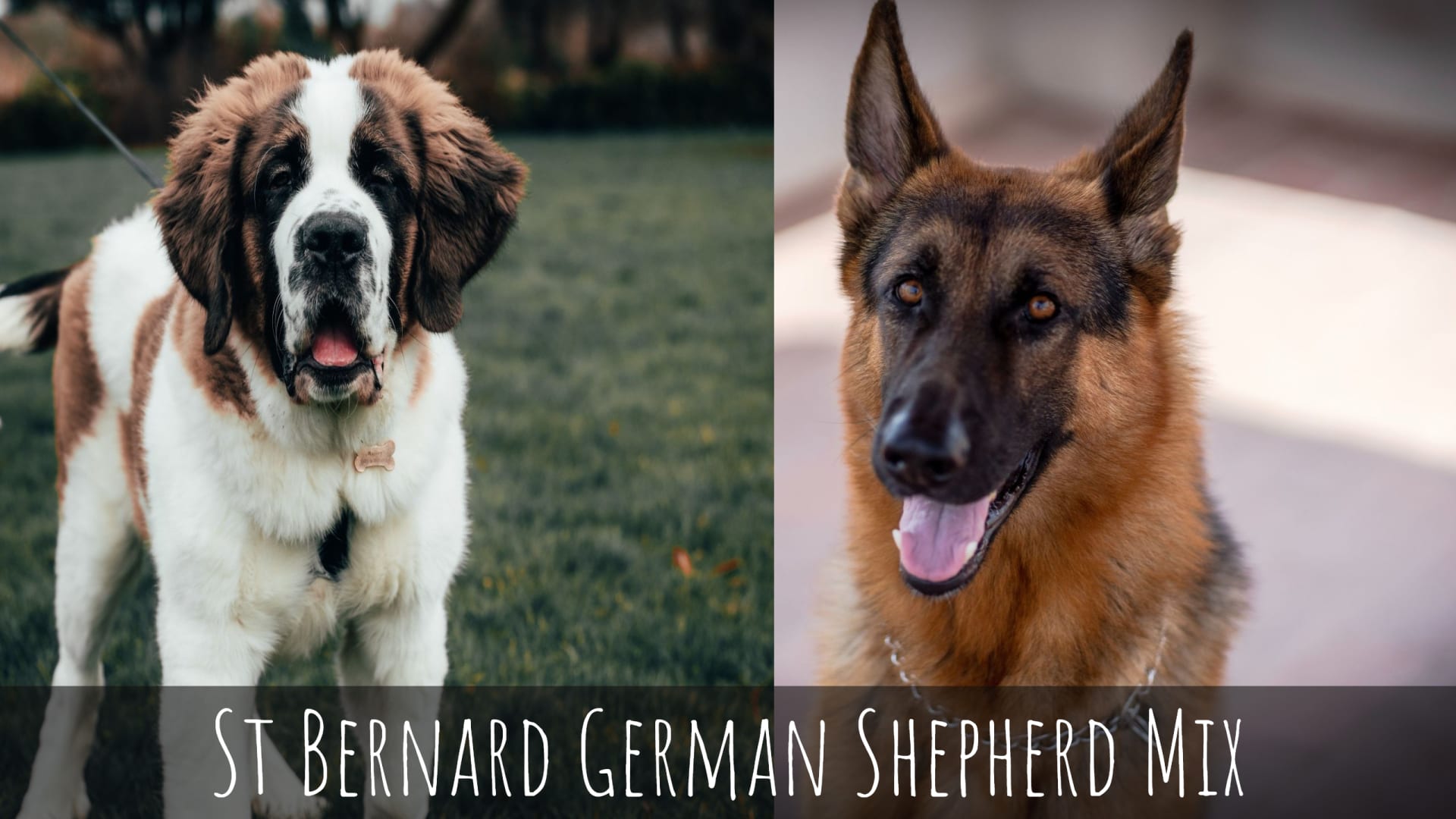The Saint Shepherd, a captivating hybrid of the gentle Saint Bernard and the intelligent German Shepherd, has captured the hearts of dog enthusiasts worldwide. This unique breed seamlessly blends the endearing qualities of both its parent breeds, resulting in a loyal, protective, and affectionate companion.
In this comprehensive guide, we delve into the world of the Saint Shepherd, exploring its captivating characteristics, essential care requirements, potential health concerns, effective training methods, and much more.
Join us as we unravel the fascinating history, distinctive traits, and charming nature of this extraordinary mixed breed. Discover the secrets to providing optimal care for your Saint Shepherd, ensuring its well-being and unwavering bond with you. Whether you’re a seasoned dog owner or embarking on your first canine adventure, this guide will equip you with the knowledge and insights necessary to create a fulfilling and harmonious life with your Saint Shepherd.
Breed Profile
The Saint Shepherd, a captivating mix between the gentle giant Saint Bernard and the intelligent German Shepherd, stands as a unique and endearing breed. This captivating hybrid inherits a captivating blend of physical and personality traits from its distinguished parentage, making it a sought-after companion for many.
Origin and History
The exact origins of the Saint Shepherd remain shrouded in mystery, but its existence is believed to date back several decades. This mix gained popularity as breeders sought to combine the desirable attributes of both the Saint Bernard and the German Shepherd, resulting in a versatile and charming canine companion.
Care and Maintenance
The Saint Shepherd is a relatively low-maintenance breed, but like all dogs, it requires regular grooming, exercise, and a healthy diet to stay healthy and happy. Here’s a detailed guide to the care and maintenance of a Saint Shepherd.
Grooming
Saint Shepherds have a double coat that requires regular brushing to remove dead hair and prevent mats. Brush your Saint Shepherd at least twice a week, and more often during shedding season. Use a slicker brush or a pin brush to remove loose hair and dirt.
You should also trim your Saint Shepherd’s nails regularly to prevent them from getting too long and uncomfortable.
Bathing
Saint Shepherds do not need to be bathed frequently. In fact, bathing them too often can strip their coat of its natural oils and cause skin problems. Bathe your Saint Shepherd only when necessary, such as after rolling in something smelly or getting particularly dirty.
Use a mild shampoo and warm water, and be sure to rinse thoroughly.
Exercise
Saint Shepherds are active dogs that need regular exercise to stay healthy and happy. Aim for at least 30 minutes of exercise per day, such as walking, running, or playing fetch. Saint Shepherds also enjoy swimming, so if you have access to a pool or lake, let them take a dip!
Nutrition
Saint Shepherds are large dogs that need a high-quality diet to support their growth and development. Feed your Saint Shepherd a diet that is rich in protein and low in carbohydrates. You can either feed your Saint Shepherd a commercial dog food or a homemade diet.
If you choose to feed your Saint Shepherd a homemade diet, be sure to consult with a veterinarian to ensure that it is nutritionally complete.
Housing and Environment
Saint Shepherds are adaptable dogs that can live in a variety of environments. However, they do best in a home with a yard where they can run and play. Saint Shepherds are also social dogs that enjoy spending time with their family.
They should not be left alone for long periods of time.
Health and Common Issues

Saint Shepherds are generally healthy dogs, but like all breeds, they are prone to certain health conditions. Some of the most common health concerns associated with Saint Shepherds include:
- Hip dysplasia: This is a condition in which the hip joint does not develop properly, leading to pain, lameness, and arthritis.
- Elbow dysplasia: This is a similar condition that affects the elbow joint.
- Osteochondrosis dissecans (OCD): This is a condition in which a piece of cartilage in the joint becomes loose and causes pain and lameness.
- Gastric dilatation-volvulus (GDV): This is a life-threatening condition in which the stomach twists and fills with gas, causing it to bloat.
- Cancer: Saint Shepherds are prone to certain types of cancer, including lymphoma, osteosarcoma, and hemangiosarcoma.
It is important to be aware of these health concerns so that you can take steps to prevent them or catch them early on. Regular veterinary check-ups are essential for maintaining your Saint Shepherd’s health and well-being.
Vaccinations and Preventative Care
Vaccinations are an important part of keeping your Saint Shepherd healthy. Vaccinations protect your dog from a variety of serious diseases, including distemper, parvovirus, and rabies. Your veterinarian will recommend a vaccination schedule for your dog based on their age, lifestyle, and risk factors.
In addition to vaccinations, there are a number of other preventative care measures that you can take to keep your Saint Shepherd healthy, including:
- Deworming: Deworming your dog regularly will help to prevent intestinal parasites.
- Heartworm prevention: Heartworm disease is a serious and potentially fatal disease that is transmitted by mosquitoes. Heartworm prevention medication will help to protect your dog from this disease.
- Flea and tick control: Fleas and ticks can cause a variety of health problems for your dog, including skin irritation, anemia, and Lyme disease. Flea and tick control products will help to protect your dog from these pests.
Training and Socialization
Saint Shepherds are intelligent and eager to please, making them responsive to training. Positive reinforcement and consistency are key in establishing boundaries and obedience. Early socialization is crucial to develop a well-rounded and well-behaved companion.
Establishing Boundaries and Obedience
- Set clear rules and expectations, communicating them calmly and consistently.
- Reward desired behaviors with treats, praise, or playtime to reinforce positive actions.
- Use a firm but gentle approach to correct unwanted behaviors, redirecting the dog’s attention to acceptable alternatives.
Socialization
Early socialization is vital for Saint Shepherds, exposing them to various people, animals, and environments.
- Attend puppy socialization classes or arrange playdates with other dogs to promote positive interactions.
- Take the dog on walks in different neighborhoods and introduce them to new sights and sounds to build confidence and reduce fearfulness.
- Allow the dog to interact with people of all ages and backgrounds to prevent shyness or aggression.
Addressing Common Behavioral Issues
Common behavioral issues in Saint Shepherds include barking, chewing, and separation anxiety.
- Barking: Provide the dog with ample exercise and mental stimulation to reduce boredom. Teach the dog the “quiet” command and reward them for being silent.
- Chewing: Offer the dog plenty of appropriate chew toys and redirect them to chew on these instead of inappropriate items.
- Separation anxiety: Gradually increase the time the dog is left alone, providing them with calming aids such as a crate or a favorite toy.
Image Gallery
Witness the charm and diversity of Saint Shepherds through our exclusive image gallery. From adorable puppies to majestic adults and wise seniors, this collection captures the essence of this remarkable breed.
Each photograph showcases Saint Shepherds in their natural element, highlighting their playful nature, unwavering loyalty, and gentle demeanor. Prepare to be captivated by their expressive eyes, plush coats, and endearing personalities.
Puppyhood
Behold the irresistible charm of Saint Shepherd puppies. Their fluffy coats, playful antics, and boundless energy will melt your heart. Watch them frolic in the grass, explore their surroundings, and cuddle up for a nap.
Adulthood
As Saint Shepherds mature, their beauty and strength become evident. Their coats develop a rich, plush texture, and their muscles ripple with athleticism. Observe them as they stand guard, accompany their loved ones on adventures, and exude an air of confidence.
Senior Years
In their golden years, Saint Shepherds retain their gentle and loving nature. Their wisdom and experience shine through their eyes, and their presence brings comfort and tranquility to their families. Witness their unwavering loyalty and deep bonds as they enjoy the twilight of their lives.
Owner Experiences and Testimonials

Read real-life experiences and testimonials from Saint Shepherd owners to gain insights into the breed’s personality, behavior, and overall ownership experience.
These testimonials offer valuable perspectives on the joys and challenges of owning a Saint Shepherd, providing a well-rounded understanding of the breed’s characteristics.
Testimonials
“My Saint Shepherd, Luna, is the most loyal and affectionate dog I’ve ever owned. She’s incredibly protective and always eager to please. Her gentle nature makes her great with children and other pets.”
Emily, Saint Shepherd owner for 5 years
“My Saint Shepherd, Duke, is a bundle of energy! He loves going on walks and playing fetch. He’s also very intelligent and easy to train. The only downside is that he can be a bit stubborn at times.”
John, Saint Shepherd owner for 3 years
“My Saint Shepherd, Bella, is the perfect family dog. She’s playful and loving with our kids and is always there to greet us at the door. She’s also very protective and makes sure to keep an eye on our home.”
Sarah, Saint Shepherd owner for 7 years
Additional Resources
Connect with fellow Saint Shepherd owners, access valuable information, and stay up-to-date on breed-related developments through reputable organizations and resources.
Explore breed clubs, rescue groups, and online forums to engage with experienced breeders, dedicated rescuers, and passionate enthusiasts.
Breed Clubs
- Saint Shepherd Club of America (SSCA): https://www.saintshepherdclubofamerica.com/
- United Saint Shepherd Club (USSC): https://www.unitedsaintshepherdclub.org/
Rescue Groups
- Saint Shepherd Rescue: https://www.saintshepherdrescue.org/
- Shepherd’s Hope Rescue: https://www.shepherdshoperescue.org/
Online Forums
- Saint Shepherd Forum: https://www.saintshepherdforum.com/
- Saint Shepherd Breeders and Owners Group: https://www.facebook.com/groups/saintshepherdbreedersandowners/
Closure
As we conclude our exploration of the Saint Shepherd, it’s evident that this exceptional mixed breed embodies the perfect balance of loyalty, intelligence, and affection. Understanding their unique characteristics and providing tailored care will enable you to foster a profound and enduring bond with your furry companion.
Embrace the joys of owning a Saint Shepherd, and witness firsthand the unwavering devotion and unwavering love they bring into your life. May this guide serve as a constant companion on your journey, empowering you to create a lifetime of cherished memories with your beloved Saint Shepherd.
Common Queries
What is the average lifespan of a Saint Shepherd?
Saint Shepherds typically have a lifespan of 9 to 12 years.
Are Saint Shepherds good with children?
Yes, Saint Shepherds are generally good with children. They are gentle and protective, making them excellent family pets.
How much exercise does a Saint Shepherd need?
Saint Shepherds are active dogs and require at least 60 minutes of exercise per day.
Are Saint Shepherds easy to train?
Saint Shepherds are intelligent dogs but can be stubborn. Patience and positive reinforcement are key to successful training.
What are the common health issues associated with Saint Shepherds?
Saint Shepherds are prone to hip dysplasia, elbow dysplasia, and bloat.




